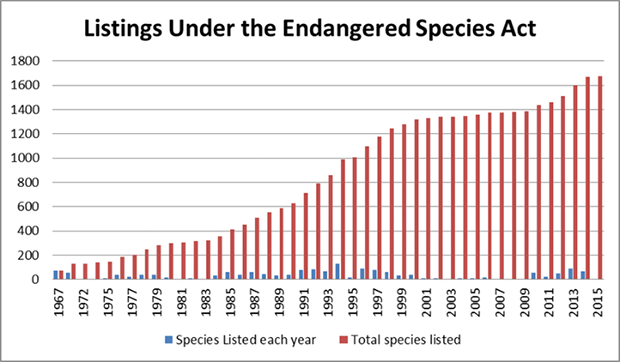Connecting state and local government leaders
Working with the U.S. Fish and Wildlife Service, researchers built a tool that uses decision science and big data to help make decisions about saving endangered species more effective and transparent.
This article was first posted on The Conversation.
A large majority of Americans strongly support the goal of preventing the extinction of endangered wildlife and plants. Today, over 1,600 U.S. species are listed under the Endangered Species Act, and more are added every year. The list includes well-known species like the manatee, grizzly bear and green sea turtle, as well as hundreds of imperiled plant species, and more than 400 species in the Hawaiian Islands.
In an ideal world, there would be enough funding and time to restore all of these species. But federal and state governments have never received more than a fraction of the funding that this would require. As a result, wildlife managers face difficult and complex choices about which species and actions to fund.
Should managers target big charismatic mammals on the brink of extinction? Low-cost, easy-to-save freshwater fish? Research into ways of saving species for which there’s currently no good turnaround strategy? There is no single answer to these questions, partly because they involve a complicated mix of science and values that affect human attitudes toward wildlife species and how well equipped agencies are to help save them. As a result, very few government agencies charged with managing species have adopted systematic methods for allocating money among species.
In a two-year project, we engaged a diverse research team to work with the U.S. Fish and Wildlife Service to assess how decision science and big data could help make decisions about saving endangered species more effective and transparent. One of our results, newly published in the journal Science, is a decision tool that focuses on identifying cost-effective recovery plans.

Funding for managing endangered species falls far short of what would be needed to help every species at risk. (World Economic Forum/David Willms, CC BY-ND)
Lessons from Down Under
Critics argue that the Endangered Species Act is ineffective because only around 1 percent of species protected under the law have recovered to the point where they can be removed from the list. This is a legitimate criticism, given that recovery plans are severely underfunded. Indeed, it is remarkable that extinction has been avoided for 99 percent of listed species. It turns out, however, that recovering species from the brink of extinction is a lot harder and more expensive than conservationists once thought.
Australia and New Zealand also have numerous endangered species, too little money to conserve them all, and too many choices about how to use it. Over the past several years, these countries have developed innovative approaches that bring together all of the best information they have about the uniqueness of species, the likelihood that funding specific actions would succeed in saving them, and cost estimates for different strategies. With this information, they have produced a transparent approach to species conservation that highlights opportunities for managers to allocate resources in ways that will maximize success.
In the Australian state of New South Wales, which has more than 1,000 endangered species, this prioritization process showed the benefits that new funding could achieve and led to an additional $100 million government investment in wildlife conservation.
With support from the National Socio-Environmental Synthesis Center, our team developed a funding allocation tool that could be employed for the United States. We used data for U.S. species, such as the cost of recovery plans, the likelihood that funding will actually lead to recovery, and factors like geographic region and taxonomy.
Our algorithm is based on a form of the “knapsack problem,” so called because it describes the challenge of filling a metaphorical backpack of limited size with a cargo that is as valuable as possible. In this case, selecting an optimal portfolio of species for funding is based on the aggregate benefits within a constrained budget.
With input data on the relative attributes of possible choices, our Recovery Explorer decision tool applies our ranking algorithm to prioritize choices according to manager objectives, and then allows for visualizing and comparing the implications of various choices.
No such solution has ever been developed to date for the problem of funding recovery efforts at the national scale in the United States.
Values still matter
The Recovery Explorer can help identify cost-effective solutions to prevent as many extinctions and achieve as many recoveries as possible. But it can’t solve contentious value-based debates about which kinds of species we should be saving.
The tool provides a way to investigate alternative valuing systems, allowing users to compare the outcomes of focusing on imminent risk or long-term potential; favoring charismatic or keystone species over others; and even of seeking a balance among such objectives. Other features can be added based on deliberations by users.
Since there is no systematic approach to prioritization currently used, we have thwarted facing the thorny issues about whether it’s more important to save birds or mammals, whether to focus on certain geographic areas or equally on species everywhere, or how to decide whether money is better used to save 100 species or just one. But we believe it’s better to bring these value-based questions into the light.
Society has an important role to play in determining the relative priority of different kinds of investments. Assuming that endangered species recovery is a priority, computer-assisted decision-making tools like the Recovery Explorer have enormous potential to help us save as many of the species Americans value as possible.
Scientists and policymakers now have an opportunity to develop a more workable strategy to improve the Endangered Species Act. And for those species that are deemed worthy of protection, the next steps will be to promote their recovery and be willing to pay for it.
NEXT STORY: Digital Record Deluge Threatens to Swamp States



